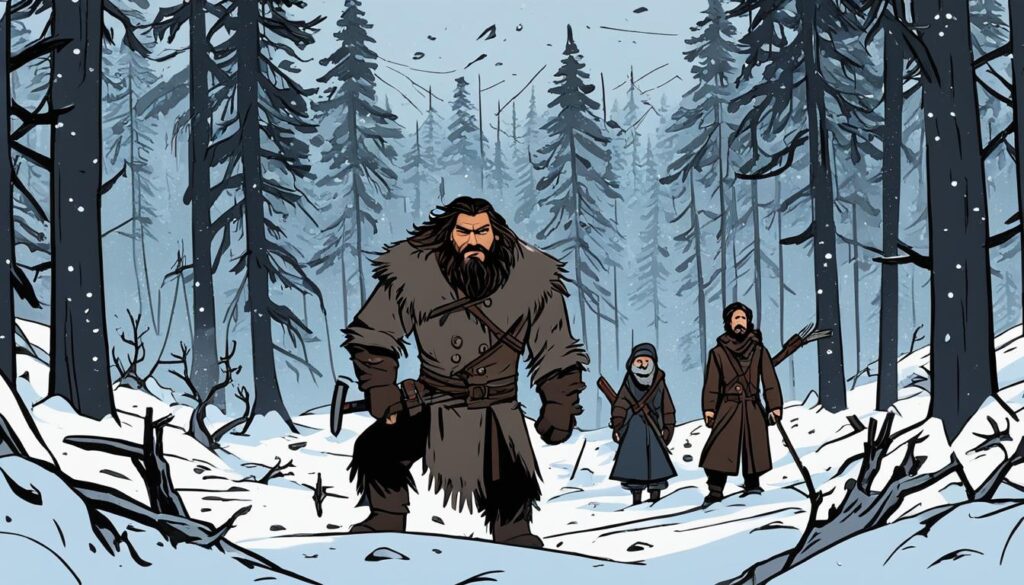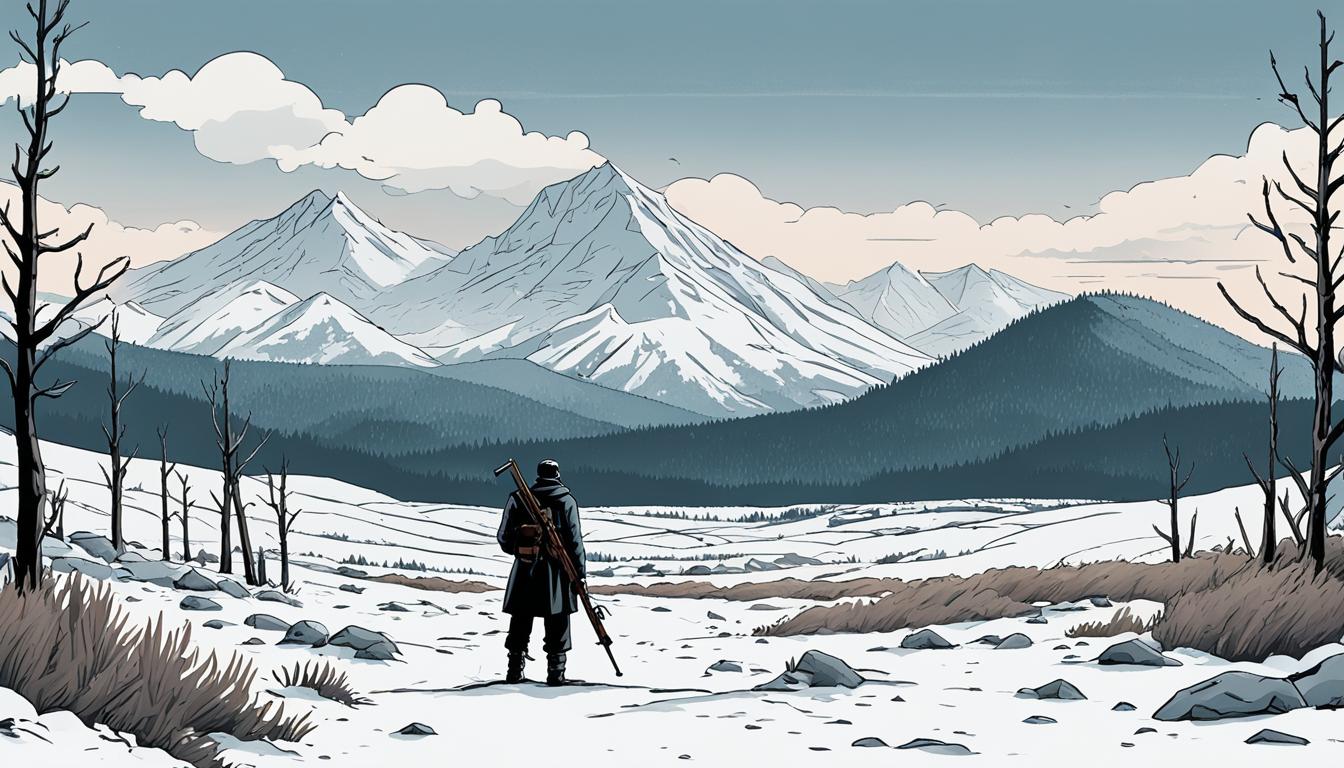Published in 2002, ‘The Revenant’ by Michael Punke is a gripping novel set in the wilderness of the American West. The story follows the thrilling tale of frontiersman Hugh Glass as he seeks revenge against the men who left him for dead after a brutal bear attack. Punke artfully weaves together themes of survival, vengeance, and the human spirit to create an unforgettable tale that has captivated readers for years.
Key Takeaways:
- Published in 2002, ‘The Revenant’ by Michael Punke is a thrilling novel set in the wilderness of the American West.
- The story follows the tale of frontiersman Hugh Glass as he seeks revenge against the men who left him for dead after a brutal bear attack.
- The book artfully weaves together themes of survival, vengeance, and the human spirit to create an unforgettable tale.
- ‘The Revenant’ has been the recipient of numerous awards and nominations, including an Oscar-winning film adaptation.
- The book has had a significant cultural impact, with its influence felt across popular media and art forms.
Synopsis of The Revenant
The Revenant by Michael Punke is a gripping tale of survival and revenge set in the untamed American wilderness of the 1820s. The story follows the legendary frontiersman Hugh Glass, who is brutally mauled by a grizzly bear and left for dead by his companions. Against all odds, Glass survives his injuries and embarks on a treacherous journey through the harsh wilderness to track down the men who betrayed him and left him to die.
The book vividly portrays the brutal realities of life in the wilderness and explores themes of resilience, betrayal, and the indomitable human spirit. Punke’s meticulous attention to historical detail creates an immersive reading experience that transports the reader to the unforgiving world of the early American frontier.
“Rarely has a book affected me so deeply. The Revenant is a masterpiece of storytelling, with unforgettable characters and breathtaking prose that will stay with you long after you’ve turned the last page.”
Background of the Author
Michael Punke, the author of ‘The Revenant,’ has a diverse background that has influenced his writing career. Punke received a bachelor’s degree from the University of Montana and later earned a law degree from Cornell University. He worked as a lawyer and then as a professor at the University of Montana School of Law.
Punke’s passion for writing led him to pen several books, including ‘Fire and Brimstone,’ and ‘Last Stand.’ In addition to his career as a writer, he served as the U.S. ambassador to the World Trade Organization in Geneva, Switzerland.
Punke’s love for outdoor activities and interest in survivalist literature is evident in his novel ‘The Revenant.’ Set in the rugged wilderness of the American frontier, it is a gripping tale of survival against the odds and serves as a testament to the author’s unique perspective and experiences.
Setting of The Revenant
‘The Revenant’ is set in the wilderness of the American West, during the early 19th century. The book portrays the rugged terrain and harsh conditions present in the uncharted wilderness of America. The story takes place in the most remote and untamed areas, where the main character, Hugh Glass, fights for his survival against the surrounding dangers of nature. Michael Punke’s precise and vivid descriptions of the wilderness in the book highlight the theme of man versus nature: the brutal forces of the environment that can challenge an individual’s strength and willpower.
The setting of ‘The Revenant’ is a crucial aspect of the book’s plot and themes. The wilderness forces the characters to confront their deepest fears and challenges, pushing them to their physical and emotional limits. Additionally, the unforgiving terrain serves as a backdrop for the story of survival, isolation, and revenge. By emphasizing the beauty and danger of the natural environment in his book, Punke creates a rich and immersive experience that transports readers to the frontier of the American West.
Main Characters in The Revenant
The Revenant features several main characters, each with their own unique backstory and motivations that add depth and complexity to the story. At the center of the book is Hugh Glass, a skilled frontiersman and trapper who is left for dead by his group after being mauled by a grizzly bear. Driven by his desire for revenge, Glass prevails against impossible odds and embarks on a journey of survival in the harsh wilderness.
Another key character is John Fitzgerald, a fellow trapper and antagonist of the story. Fitzgerald’s selfish actions place Glass in harm’s way and set the stage for the ensuing conflict between the two men. Meanwhile, Bridger and Hawk are two young trappers caught in the middle of Glass and Fitzgerald’s feud. Their decisions and actions ultimately have a significant impact on the outcome of the story.
Michael Punke does an excellent job of developing these characters throughout the book, providing a detailed analysis of their thoughts and actions. Through his masterful storytelling, Punke creates a cast of characters that readers can root for, empathize with, and despise all at once.

Themes in The Revenant
The Revenant explores the themes of survival and vengeance through its gripping narrative. From the very beginning, the book chronicles the harrowing experiences of its protagonist Hugh Glass, who is left for dead in the wilderness after a brutal bear attack. As he struggles to survive in the unforgiving terrain, the story delves into the primal instincts that drive him to seek revenge against those who wronged him.
Throughout the book, the themes of survival and vengeance are intricately intertwined, with each informing the other. As Glass fights for his survival, his desire for revenge becomes a constant motivation, driving him forward despite insurmountable odds. The book thus offers a sobering commentary on the human condition, showcasing how our innate drive for self-preservation and justice can collide and intertwine in unexpected ways.
“For the last time I lie here, the ground and my blood mixed into a clay, daubed upon not just the rocks and the leaves, but smeared across what were the heavens in my last sight. And under me, just as I’d feared, crawled all manner of beast and loathsome growth, eager to partake in the banqueting of broken flesh.”
The book’s exploration of survival and vengeance is both gritty and rewarding, offering a vivid portrayal of the human experience in its rawest form. Through its evocative prose and visceral storytelling, The Revenant leaves a lasting impact on its readers, provoking thoughtful reflection and critical analysis long after the final page is turned.
Plot Summary
In ‘The Revenant’, set in the early 19th century, Hugh Glass, a skilled frontiersman and fur trapper, is brutally attacked by a grizzly bear while on a hunting expedition in the wilderness. Severely injured and abandoned by his fellow hunters, Glass sets out on a vengeful mission to track down those who left him for dead.
Despite his harrowing journey, Glass perseveres, relying on his instincts and survival skills to brave the ruthless topography of the American West. Along the way, he encounters a range of characters, both friendly and hostile, each adding to the complex and captivating plot.
The book is an enthralling tale of one man’s quest for retribution and the lengths he is willing to go to achieve it. With vivid descriptions of the unforgiving natural world and a thrilling storyline filled with unexpected twists and turns, ‘The Revenant’ is a gripping read from start to finish.
Michael Punke, The Revenant
Writing Style of Michael Punke
Michael Punke’s writing style in ‘The Revenant’ is notable for its vivid descriptions, immersive storytelling, and authentic depiction of the wilderness. Punke employs a lean, spare prose that captures the harsh realities of survival in the unforgiving landscape. His descriptions of the natural environment are particularly evocative, using sensory language to immerse the reader in the sights, sounds, and smells of the wilderness.
Punke’s narrative technique in ‘The Revenant’ is marked by a precise attention to detail and a methodical approach to storytelling. The book is structured around a series of challenges and obstacles that the protagonist, Hugh Glass, must overcome in his quest for vengeance. Punke uses these challenges to build tension and suspense, keeping the reader engaged and invested in the outcome of the story.
“The Revenant is a remarkable novel, as powerful and disturbing as anything I’ve read in years. The spare, elegant prose propels the reader forward, relentlessly building tension and suspense. Michael Punke has a keen eye for detail and an unerring sense of pacing, making this a book that is impossible to put down.” – Dan Brown
Overall, Michael Punke’s writing in ‘The Revenant’ is a masterful blend of immersive description, methodical storytelling, and authentic historical detail. His prose captures the brutality and beauty of the wilderness, creating a visceral and unforgettable reading experience.
Critical Reception of The Revenant
Since its publication, ‘The Revenant’ by Michael Punke has garnered widespread critical acclaim. The book has received numerous accolades, including the 2016 Spur Award for Best Western Historical Novel, and was also a finalist for the 2017 High Plains Book Award for Fiction.
According to critics, Punke’s writing style is immersive and vividly portrays the harsh realities of survival in the wilderness. Booklist’s review notes that “The Revenant is an astonishing novel, a fitting tribute to the fortitude of a man who endured incredible hardships and wrested a small measure of revenge from those who robbed him.” (Booklist, 2015)
Similarly, The Observer‘s review of the book describes it as “an astonishing story of revenge, grit and survival that is raw, primal and compelling.” (The Observer, 2015)
Overall, the critical reception of ‘The Revenant’ has been overwhelmingly positive. The book’s gripping storyline and well-crafted characters have cemented its place as a classic of adventure and survival literature.

Cultural Impact of The Revenant
‘The Revenant’ by Michael Punke has had a profound cultural impact, which extends beyond the literary world. The book has been adapted into an award-winning film, which has further increased its reach and influence on popular culture.
The harrowing portrayal of survival and revenge in the wilderness has been highly praised by audiences and critics alike, cementing its place as a modern classic. The film adaptation, directed by Alejandro G. Iñárritu and starring Leonardo DiCaprio, won numerous awards, including three Oscars for Best Director, Best Actor, and Best Cinematography, showcasing the enduring legacy of this powerful story.
Box Office Success
The film adaptation of ‘The Revenant’ was a box office success, grossing over $500 million worldwide, underlining its widespread appeal and influence on popular culture. It was particularly well-received in North America, where it earned over $183 million, highlighting the significance of this story in the cultural landscape.
Further References in Media
‘The Revenant’ book and film adaptation have become a cultural touchstone, referenced and parodied in various media. Its impact on popular culture can be seen in everything from T.V shows to music videos.
“The Revenant proves that a film can be both incredibly beautiful and difficult to watch at the same time.”
– The Guardian
Overall, ‘The Revenant’ has made a significant cultural impact with its visceral depiction of human endurance and survival in the face of extreme adversity. Its influence on popular culture, through its successful film adaptation and references in other media, is a testament to the enduring power of Michael Punke’s novel.
Comparison with the Film Adaptation
When ‘The Revenant’ was adapted into a film in 2015, fans of the book eagerly awaited its release. While the film adaptation, directed by Alejandro Gonzalez Inarritu, received critical acclaim and numerous awards, it differed significantly from the book in certain aspects.
One major difference between the book and the movie is the character of Hugh Glass. In the book, Glass is portrayed as a relatively ordinary fur trapper with a Native American wife and child. In contrast, the film version of Glass, portrayed by Leonardo DiCaprio, is a far more tortured and complex character, haunted by the memory of his deceased wife and driven by a fierce desire for revenge.
Another key difference is the treatment of the Native American characters. While Punke’s book depicts Native Americans as antagonistic and violent towards white fur trappers, the film adaptation presents a more nuanced portrayal, highlighting the injustices and brutality that First Nations people faced at the hands of white settlers.
The film also depicts events and characters that are not present in the book, such as the character of John Fitzgerald, played by Tom Hardy, and his conflict with Glass. Additionally, certain events in the book are either omitted or altered in the film, creating a different overall narrative.
Despite these differences, the film adaptation of ‘The Revenant’ was widely acclaimed and introduced Michael Punke’s novel to a wider audience. While the book and the movie offer distinct interpretations of the same story, each has its own merits and unique appeal.
Symbolism in The Revenant
Symbolism plays a significant role in ‘The Revenant,’ adding depth and meaning to the narrative. The author uses various symbolic elements and metaphors to portray themes such as survival, revenge, and redemption.
One recurring symbol in the book is the bear, which represents both the harsh, unforgiving wilderness and the protagonist’s inner demons. The bear attack serves as a catalyst for the main character’s transformation, and the bear itself becomes a symbolic representation of his struggle to survive and seek vengeance.
Another essential symbolic element in the book is the river. The river represents both a physical barrier and a metaphorical threshold that the protagonist must overcome to achieve his goals. The river serves as a symbol of rebirth, allowing the protagonist to shed his old identity and become a new person.
The use of symbolism in ‘The Revenant’ helps to elevate the story beyond a simple tale of survival and revenge. It adds layers of metaphorical meaning, highlighting the character’s internal struggles and providing a deeper understanding of the themes explored in the book.
Impact on Readers and Final Thoughts
Since its publication, The Revenant has received widespread acclaim from readers and critics alike. The book’s gripping portrayal of survival and revenge in the harsh wilderness has struck a chord with many, prompting numerous personal reflections and reactions.
One reader, John, commented: “I was completely engrossed in this book from start to finish. The vivid descriptions and authentic characters made this an unforgettable read.” Another reader, Sarah, shared her personal reflection: “Reading The Revenant was a visceral experience. The intense emotions and struggles depicted in this book left a lasting impression on me.”
In my personal opinion, the book’s exploration of humanity’s primal instincts and the struggle for survival in a brutal environment is what makes it a timeless classic. Michael Punke’s writing style and attention to detail combine to create a vivid depiction of life in the 19th century.
“The Revenant is a masterpiece of storytelling. Punke’s seamless blend of history, adventure, and emotion make it a book that everyone should read.”
Overall, The Revenant is a book that resonates with readers long after the final page is turned. Its impact on popular culture and enduring appeal stand as a testament to its literary significance.
Conclusion
After delving into the world of ‘The Revenant’ by Michael Punke, it is evident that the book is a powerful testament to the human spirit. The story of survival in the wilderness and the unrelenting pursuit of vengeance is both captivating and heart-wrenching.
Punke’s writing style is masterful, with vivid descriptions that transport the reader to the harsh and unforgiving world of the book. The character development is also impressive, with nuanced and complex individuals driving the narrative forward.
The critical reception and cultural impact of ‘The Revenant’ speak to its enduring appeal and widespread acclaim. The book, in addition to its film adaptation, has left an indelible mark on popular culture and continues to be a favorite among readers of all ages.
Overall, ‘The Revenant’ is a must-read for anyone looking for a gripping tale of survival and revenge. It is a powerful reminder of the strength of the human spirit and the lengths one can go to achieve justice.
In conclusion, Michael Punke’s ‘The Revenant’ is a literary masterpiece and a true tour de force that will leave readers breathless and in awe.



